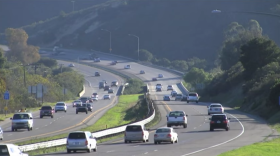ALSO: Are you using the original pronunciation of this popular California tourist destination?
Step into the J Lohr Winery tasting room and there's a good chance you'll meet up with Willis Rieser, or Willy as he's called by most. He deals with tourists from around the world, all day long, and he tells them the "grapes are coming from Paso Robles (said ROH-buhlz), from J Lohr."
In fact, that's how you'll hear it said by just about everyone in the tasting room, but pull aside the company's Chairman and CEO, Steve Lohr and you'll hear it said Paso ROH-blays, with a distinct Spanish accent.
"I say it that way simple because I took a little Spanish growing up in school, and we have a great Hispanic work force here, both in the Vineyards and the winery and out of deference to them I want to pronounce it in their language," said Lohr. "Plus, it's such a beautiful name, Paso Robles, it just rolls off the tongue."
But Lohr is likely in the minority when it comes to winemakers in the Valley, says industry spokesperson Chris Taranto. He works for the Paso Robles Wine Country Alliance and it's his job to market the area, both locally and internationally. Taranto arguably says the name of this city and wine-growing region more times per day than just about anyone in the area, and hears it said by a wider variety of people than most.
While Taranto most often uses the anglicized version when he says Robles, he will on occasion switch over to the more traditional Spanish accent. During a recent marketing trip to Singapore, Taranto even got called out for his fluctuation in pronunciation.
"I did have a hand go up and say, hey excuse me, but you've changed how you say it," said Taranto. "It kind of caught me a little off guard because at that point in time I actually didn't mean to. I actually was thinking I was going to say Robles (ROH-blays) and I fell into Robles (ROH-buhlz), and so it caused a whole discussion about Robles Robles."
We took a trip to the History Center of San Luis Obispo County to speak with docent Leon Koenen in an effort to gain some historic perspective on the city's name. Turns out, the full name El Paso de Robles was taken from a Mexican land grant handed down in the mid 1800s and literally translates as the Pass of the Oaks.
Docent Leon Koenen says California is full of these place names with Spanish origins.
"Now, that creates somewhat of a problem because now we're talking what is proper and what is acceptable," said Koenen. "What is dialect, now California has a unique dialect that is made up of people from all over the world."
Koenen says place names evolve as these dialects work into the mix, and some believe, including Koenen that's currently happening with this particular city.
"With the introduction and growth of the wine industry, there comes a change in what is acceptable and what is proper, and so you can almost tie what we now insist as Robles (ROH-blays) to a change sometimes not only in the population but the economics that drive the population," said Koenen.
But, Chris Taranto doesn't see this change happen all that quickly.
"So many of the residents that have absolutely nothing to do with the wine industry or tourism that have been there for so long, Robles (ROH-buhlz) is Robles and it gets passed on down and it would be a tough change to start telling the fifth generation of a Paso Roblan to say Robles (ROH-blays)," said Taranto.
Make a quick call to The Paso Robles City Hall and you will hear the city's name pronounced with the anglicized accent on the outgoing message. So, for now anyway, ROH-buhlz is the accepted version being used by the city, which is about the most official source you can have at this point.





